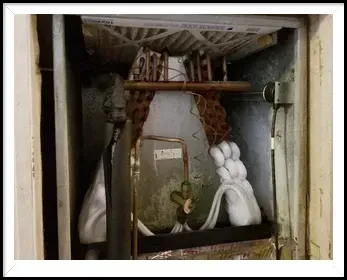Evaporator Coil Leaking Freon
A leaking evaporator coil is one of the most common — and costly — problems homeowners face with their central air conditioning systems. If you suspect your evaporator coil is leaking freon, it’s critical to act quickly to avoid high energy bills, reduced cooling efficiency, and long-term damage to your HVAC system. At John’s Heating, Cooling, and Appliance Repair, we specialize in diagnosing and repairing refrigerant leaks in homes throughout Fayetteville, Peachtree City, Newnan, Sharpsburg, Griffin, and Senoia, GA.
What Does the Evaporator Coil Do?
Your evaporator coil is a major component of your central air conditioning system, located inside the indoor air handler. It plays a vital role in the cooling process by:
- Absorbing heat from the air in your home
- Condensing moisture, which reduces humidity
- Circulating refrigerant (freon) that carries the heat outside
Contrary to popular belief, your AC doesn't create cold air—it removes heat and humidity from inside your home. The evaporator coil is the part of the system where that process begins.
Signs Your Evaporator Coil Is Leaking Freon
- If you notice any of the following symptoms, your AC evaporator coil may be leaking:
- Your AC is blowing warm air
- The unit won’t turn on or shuts off repeatedly
- Ice is forming on the evaporator coil or outdoor unit
- You hear hissing or bubbling sounds coming from the system
- There's visible refrigerant leakage near the indoor unit
- The system runs constantly, struggling to reach the set temperature
- You see a sudden spike in your energy bill
Warning: Freon Is Toxic
Freon is a hazardous chemical. Do not touch or inhale refrigerant if you suspect a leak. Keep children and pets away from the area. Always call a licensed HVAC technician like John’s Heating, Cooling, and Appliance Repair for inspection and repair.
What Causes an Evaporator Coil to Leak Freon?
There are several reasons why your evaporator coil may begin to leak refrigerant:
🔹 Chemical Reactions (Formicary Corrosion)
High humidity combined with volatile organic compounds (VOCs)—from household cleaners, cosmetics, paints, and air fresheners—can trigger chemical reactions with the copper tubing in the coil. Over time, this leads to tiny pinhole leaks.
🔹 Normal Wear and Tear
The refrigerant flowing through the system creates vibrations over time, weakening the copper tubing.
🔹 Corrosion and Rust
Moisture on and around the coil (especially in steel parts) can lead to rust and corrosion, which eats away at the metal and causes leaks.
🔹 Manufacturing Defects
In some cases, factory flaws or poor design can make coils more prone to early failure.
🔹 System Age
Older systems (10–15+ years) naturally develop wear that makes them more vulnerable to leaking freon.
What Should You Do If Your Evaporator Coil Is Leaking?
If you think your Air Conditioner is leaking freon, don’t wait. Running the system can cause additional damage and reduce your indoor air quality. Here’s what to do:
- Turn off the AC system
- Call a licensed HVAC technician immediately
- Have the system tested for refrigerant leaks and pressure levels
- Consider repair vs. replacement based on age and cost
Serving Fayetteville, Peachtree City, Newnan, and Beyond
At John’s Heating, Cooling, and Appliance Repair, we offer:
- Expert refrigerant leak detection
- Evaporator coil repair or replacement
- Honest advice and affordable pricing
- Fully licensed, insured, and BBB-accredited service
Don’t Let a Freon Leak Leave You Sweating!
If your Air Conditioner is acting up or you suspect a leaking evaporator coil, give us a call today. We proudly offer HVAC Services to Fayetteville, Peachtree City, Newnan, Sharpsburg, Griffin, and Senoia, GA, with reliable, same-day service.
📞 Call now (678) 603-7775
Or schedule online to have your system inspected by the experts at John’s Heating, Cooling, and Appliance Repair.

